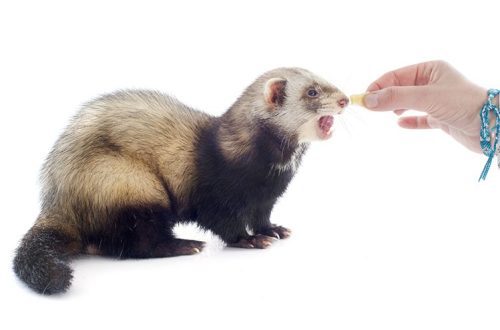
Adrenal disease in ferrets
Adrenal disease in ferrets is a serious problem that, if left untreated, leads to the most unpleasant consequences. Unfortunately, this is one of the most common diseases of all mustelids. Since the most common domesticated mustelid is the ferret, every owner should be aware of its primary symptoms in order to contact a veterinarian in a timely manner.
Adrenal disease (or, another name, hyperadrenocorticism) is an increase in the production of hormones produced by the adrenal glands, which is most often caused by a tumor. Hormonal failure leads to serious disorders in the body, including anemia – this is a serious disease associated with a decrease in the number of blood/plasma cells and a violation of its coagulability. The sooner the treatment is carried out, the more effective the result will be.
If you do not take action, the disease can lead to death. Or complicate the surgical intervention of a veterinarian due to the fact that blood clotting will be almost zero. The pet may die due to ordinary capillary bleeding.
The risk group is made up of ferrets over the age of 3 years. Young mustelids suffer from this disease much less often, however, it can develop at any age. But you need to understand that statistics is not a fundamental factor in this disease: a ferret can get sick with it in any age category.
Causes of adrenal disease
There are quite a few triggering factors. The most common: too early castration (at the age of 5-6 weeks), improper lighting and daylight hours, unbalanced feeding and, of course, genetic predisposition. In rare cases, the disease can occur due to improper castration performed before three weeks of age.
Symptoms of adrenal disease in ferrets
Severe hair loss, focal alopecia can testify to the disease. Hair loss usually starts at the tail and gradually progresses towards the head. In addition, the ferret’s behavior is disturbed, it becomes lethargic and apathetic, and rapidly loses weight. There may be skin itching, increased musky smell, weakness in the hind legs. In females, swelling of the genital organs develops due to increased secretion of estrogen, in males – an increase in the size of the prostate gland and difficulty urinating. Castrated males with this disease often begin to mark the territory.
It is important to understand that any ferret can go bald due to a lack of essential amino acids in the diet and give off a musky smell. Therefore, for an accurate diagnosis, you need: ultrasound diagnostics, blood tests for the hormonal spectrum, clinical analysis and biochemical blood tests.
Without timely treatment, adrenal disease leads to anemia, uremia and, as a result, death. There is no standard set of symptoms for this disease; certain symptoms may appear in one sick animal and not in another. Therefore, the detection of at least one of the above signs is a reason to visit a veterinarian!
If you notice the symptoms of the disease, and they subside and after some time the ferret’s coat returned to normal, do not rush to conclude that the disease has cured itself. Most likely, the hormonal background has balanced under the influence of certain factors, but after some time the disease will definitely remind of itself again – and the symptoms will be much stronger.
Treatment
Adrenal disease is the very case when delay and self-medication pose a huge threat to the life of a pet. Only a specialist should prescribe treatment. In most cases, surgical intervention is necessary to eliminate the problem, but recently, therapeutic methods have also been successful in the early stages of the disease.
Take care of the health of your pets and always keep the contacts of a competent veterinarian at hand!





